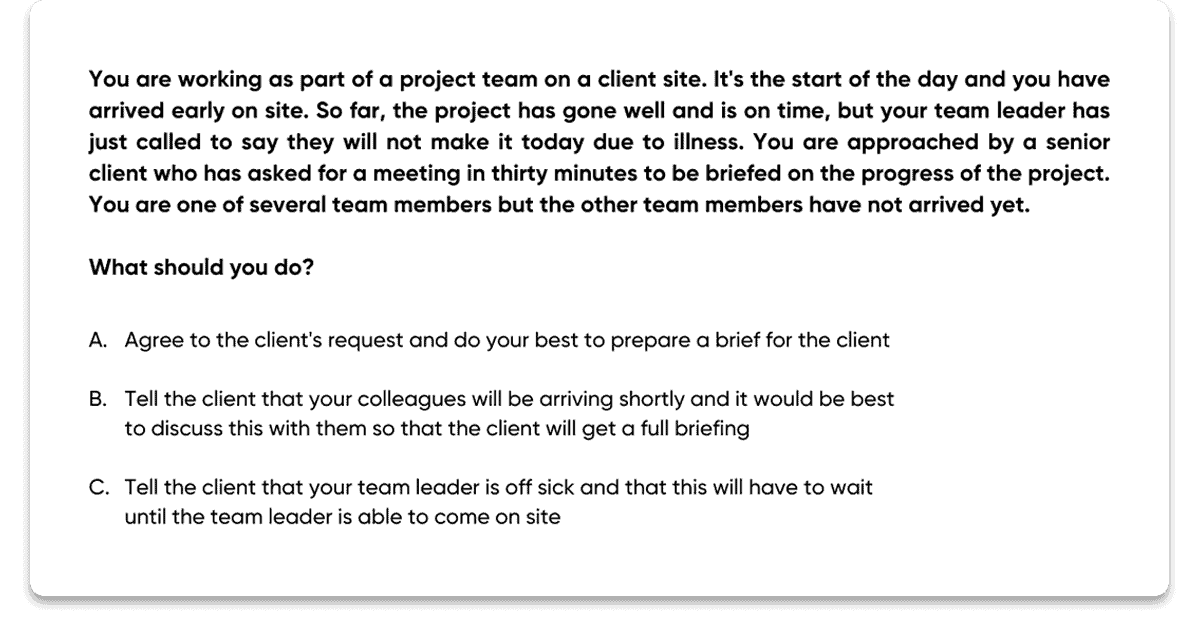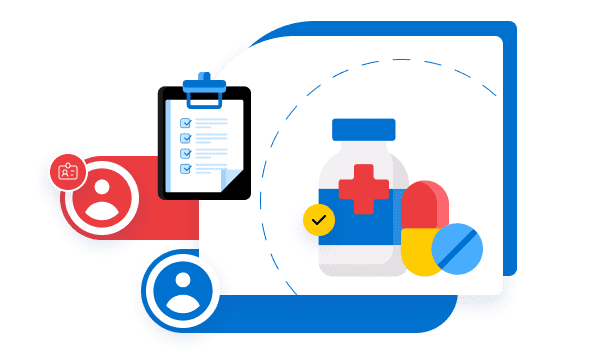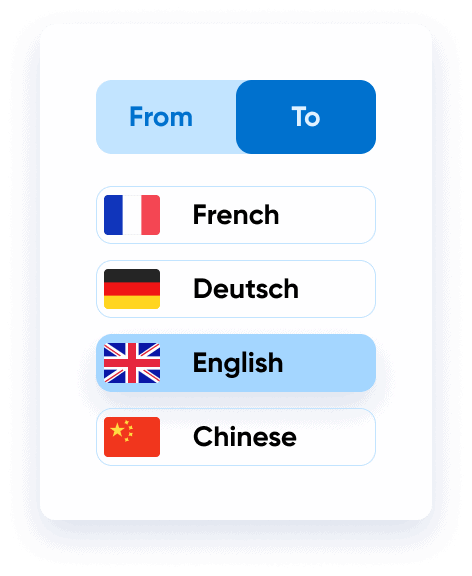What is a pre-employment assessment test?
Recruitment is one of the hardest tasks in business. Hiring the right person to take a role rapidly and effectively is critical but difficult. Even at the most successful companies, there is a significant number of poor hires. Statistics vary, but at least one survey suggests that generally, around 28% of new hires don’t make 90 days in their new job, and many more leave before their first year. An unsuccessful hire wastes time and money onboarding the employee and loses the value of a successful hire.
Pre-employment (also called pre-hire) tests, when implemented well, can improve the odds. By giving an objective test to candidates in the recruitment process, you gather data to help choose the best person to maximize the chance of a successful hire. Pre-employment tests can provide quantifiable data to aid recruitment and help the recruitment process be more objective, efficient, inclusive, and fair.

Quick links
What is the role and importance of pre-employment tests?
Hiring
Pre-employment tests are an effective means to narrow down the hiring pool and ensure your new hire will be a good fit for the team and capable of succeeding in their role.
Organizational fit
A person’s alignment with your business values, mission, and working style is all just as important as their skill set—something that a pre-employment test can help identify early on.
Benchmarking
Pre-employment testing—when done well—is excellent not only as a means of testing employee skills, knowledge, and attitudes but also as a means of benchmarking their progress. What’s more, it can be used as a means of benchmarking an employee against other relevant team members to see how aligned they are.
Skills gap analysis
Pre-employment testing is a means of ensuring you’re plugging skills gaps within your current team by enabling employers to analyze if a potential new hire has the correct skills.
What are the most popular types of pre-employment tests?
Pre-hire/pre-employment tests can be used to help screen candidates so that only those who achieve certain scores are considered for the job role, or else to evaluate promising candidates to help identify strengths and weaknesses to aid the hiring decision.
Ability tests
Ability and aptitude tests are widely used to measure the cognitive ability of job candidates. There are many different flavors of such tests – verbal reasoning, numerical reasoning (a good example of which are data literacy tests,) and inductive reasoning being the most common.
Such tests are usually not job specific but measure someone’s general mental ability. There are many psychological studies that show that general mental ability is a valid predictor of many kinds of job performance, that is to say, that people who do well at such tests often are successful in job roles.
Personality tests
These are usually “self-report” tests in that someone is asked a series of questions that allows an inference to be made about their personality traits. A common style of the test (“the big 5 model”) measures Openness, Conscientiousness, Extroversion, Agreeableness, and Neuroticism / Emotional Stability. Such tests are widely used to help identify appropriate candidates, but there is less psychological consensus around their usefulness and validity. Overall, personality tests have more use as an employee fit tool and a measure of how to best lead them rather than a recruitment assessment test.
Situational judgment tests (SJTs)
These tests present candidates with a scenario and require them to indicate how they would respond to that situation or the extent to which a response is more or less likely to be effective. They are often used to assess judgment and to allow both candidate and employer to assess job fit. Here is an example SJT:

SJTs take effort to write well but are a good way of assessing domain knowledge and people’s ability to deal with ambiguity and real-life dilemmas. For more information on SJTs, see our white paper “Assessing for Situational Judgment”.
Language tests
These tests measure proficiency in a language. These can be useful to ensure that someone is sufficiently competent in a language for a job role. Such tests often assess listening, speaking, reading, and/or writing skills.
Skills tests
These tests focus on a specific job skill, for example, software development skills, the ability to use a specific software system, or customer service skills. Often companies will employ a form of performance-based testing for IT leaning roles in need of testing a candidate’s on-the-job software skills, while other more hands-on roles, like construction work or pharmaceutical sales representative roles looking to measure safety and compliance might use a form of Observational assessments.
If a job role has particular skills needed, then assessing whether a candidate has that skill and can apply it in a real-world setting is extremely valuable.
Integrity tests
Integrity tests, as the name suggests, are about how reliable, honest, and ethically minded an individual is. Assessments of this sort are often geared towards a candidate’s propensity to behave nefariously, like steal, cheat or lie. There are two forms of integrity tests, known as covert and overt integrity tests that measure integrity in two specific ways.
For example, covert integrity tests are typically more subtle and indirect in their questions, and so won’t ask outright if a candidate would consider cheating on a workplace exam, but might ask: ‘Agree or disagree: rules are there to be broken’.
Overt integrity tests, on the other hand, make it clear what the intent behind the question is, and so an example of one might be: ‘Agree or disagree: would you consider adding false entries to your timesheet dishonest?’
Knowledge assessments
Knowledge assessments are essential for measuring whether a candidate has the theoretical know-how required to succeed in a role. For an HR professional, this might mean having an understanding of employment laws, for sales and marketing specialists, it might be having knowledge of the B2B market, or for a higher education professional, it might be understanding the need for assessments to be fair, valid and inclusive.
Problem-solving assessments
Problem-solving assessments are a variant of ability tests and are useful for testing how a candidate approaches problems and comes to a solution.

When applied as part of a pre-hire assessment, it can be an excellent tool for identifying top talent from a recruitment pool, discovering which candidates have leadership potential, and also allows an organization to keep abreast of ‘soft skills’ within their organization—something often overlooked and yet hugely important.
This type of assessment can also be known as a Thinking Skills Assessment and is used commonly in recruitment for both academic and employment purposes.
Behavioral competency assessments
Behavioral competencies assessments are an umbrella term that can look at many facets of an individual. Typically, behavioral assessments will look at the characteristics an individual shows, like decisiveness, initiative, and diplomacy, as well as patterns of behavior. By assessing a candidate’s interpersonal competencies, as well as their ability to motivate themselves and others and/or manage others, recruitment professionals can get a good idea if a candidate has the necessary skills to succeed, but it also provides insight as to whether they’re a good person-organization fit.
Factors that determine the type of pre-employment assessment used
Job requirements

Depending on the type of skills and/or knowledge required for any given job determines the type of pre-employment test that might be required. For example, while someone might take a lab test to assess IT skills if they are going to fill an IT-based role, this would be much less useful for someone applying for a pharmaceutical sales position or sales and marketing role.
Company culture
Company culture is something many new hires are interested in. For employers too, it’s essential to know that your new hire is going to fit into the team. With pre-employment assessments, recruiters can bring the right people to the table and avoid a new hire leaving before their probationary period is even complete.
Legal considerations
Pre-employment tests are excellent tools – but it’s critical to bear in mind the legal issues in Pre-employment testing and how to avoid them. For example, pre-hire tests have to adhere to Equal Employment Opportunity Laws, ensuring that they aren’t discriminating based on factors such as Sex or Race. Added to this, the legal implications vary by country, adding another layer of complexity.
Budget
The budget needed to roll out valid and reliable tests and assessments is nearly always far less than that of taking on a bad hire. For example, for some companies the cost of a bad hire can be as high as $240,000.
Benefits of using pre-employment testing in the hiring process
Improved hiring decisions
Recruitment isn’t easy, and while the quest for the ‘perfect’ candidate is typically one that ends in disappointment, it’s equally true that roughly three in four employers are affected by a bad hire. By using pre-employment assessments and incorporating factors like predictive validity, recruiters and hiring managers can better source high-caliber candidates.
A fair opportunity for all candidates
By using valid and fair pre-employment tests and assessments, recruiters and those sourcing candidates are providing an unbiased opportunity for a potential new hire to show their skills and knowledge. If this pre-hire test method isn’t part of a recruiter’s arsenal, concerns can be raised as to what they’re using to determine skill level. Remember, 78% of job seekers lie on their resume which is why they can’t be taken at face value.
Speeds up the hiring process
Hiring is an arduous and lengthy process, often requiring a lot of man-hours and trawling through resumes to whittle down a pool of candidates to take through to the next round. With pre-employment testing, recruiters can speed up this process by using the results as a clear indicator of who should be considered for the next stage of the hiring process.
Cost savings
Using a pre-employment test might seem like an added step—often with a cost attached—but considering a single bad hire costs companies an average of $14,900, it quickly becomes clear that a pre-hire test is infinitely more cost-effective than forgoing it and hoping you’ve made a good pick based on an interview and CV screen alone.
Common concerns about pre-employment tests
Reliability and validity of test results
As with all assessments, you only get good results if your tests are fair, valid and reliable. Ensuring you create assessments with leading assessment platforms and psychometric professionals is key to making this a reality.
Potential for discrimination
Bad assessments can, of course, discriminate. If they don’t account for language barriers or cultural diversity, then it’s not only woefully unfair but also means the results are meaningless. For assessment experts, creating superior assessments means accounting for inclusivity and diversity and is yet another reason why recruiters should think carefully about how they create and deliver pre-hire assessments.
The best pre-hire tests have predictive validity, that is to say, there is a demonstrable relationship between test results and job performance. If that is the case, then making a decision that takes into account the test results will likely lead to better hiring.
In the U.S., it’s important to follow the Uniform Guidelines on Employee Selection Procedures. And in Europe, the UK (and increasingly in other parts of the world), there are constraints on using automation or AI to make decisions about people and a human should usually review test results before any decisions are made.

It’s also important that your hiring process is fully inclusive. Ensure that any pre-hire test is accessible to those with disabilities, does not have any cultural or demographic bias, and is relevant to the job role. Be aware that some people may have test anxiety, some people may have to take the test in a non-native language and consider how to deal with such things. If delivering the test at people’s homes, consider that some people may have limited equipment and/or slow Internet bandwidth.
It’s also worth remembering that candidates can and do cheat on tests, for example by getting help or by getting someone else to answer for them. It’s possible to reduce cheating by having the tests proctored or invigilated and via other measures.
No test is perfect. It’s really important that you don’t make a decision solely on the basis of a single pre-hire test; the results of a pre-hire test should be considered just one piece of information to inform who to hire.
Where can you source pre-employment tests?
There are very many suppliers of pre-made pre-employment tests, particularly ability and personality tests. Some of the well-known, international providers are DDI, Fifth Theory, Hogan, Pearson, Revenlian, SHL, Talogy (previously PSI), and Thomas, but there are also many other providers and many companies strong in individual markets. Some test providers are members of the Association of Test Publishers, which encourages a high level of professionalism and business ethics in testing.
Questionmark does not provide pre-made pre-employment tests, however, our assessment management system, Questionmark OnDemand, is used by many corporations and government departments to develop their own custom pre-employment tests. If you need to develop a skills test or situational judgment test that focuses on particular job roles within your organization, our technology and services can help you. What’s more, we can then continue to support you after hiring by helping you effectively measure training effectiveness for ongoing corporate training.
How to work out whether testing is effective in your organization
The most successful users of pre-employment / pre-hire tests evaluate the effectiveness of their test use over time. A common approach is to conduct a predictive validity study to determine if pre-hire test results predict the future performance of candidates. For example, if candidates who turn out to be weaker hires did well at pre-employment tests that would raise a red flag.
We may not all be like Steve Jobs who shared that “The secret of my success is that we have gone to exceptional lengths to hire the best people in the world.” But pre-hire tests, used well, can help us hire better and make our businesses more successful.
Frequently Asked Questions
Yes, usually pre-hire or pre-employment tests are considered good at identifying job performance so long as the tests are of good quality and take into account reliability, validity, and inclusivity.
No, pre-employment testing isn’t necessary for all jobs and is typically up to the organization and hiring manager to decide if they’re necessary. Some roles often only require candidates to share their portfolio of work and attend an interview for example.
No, it might be that for some roles you need very specific skill sets, such as the ability to use and manage certain software, which would not be applicable to every job role. Good new hire tests -like all assessments – should be specific and tailored, hence each one is different depending on the job role.
Good Pre-employment tests should be inclusive and fair. If a test is neither of those things it has no place as part of the hiring process, or indeed, any process.
Preparing for a pre-employment test very much depends on the nature of the job role a candidate is applying for. Doing your due diligence before applying by researching the company, being clear about the job description, and where possible, completing mock Pre-employment tests are all helpful methods of preparation.
The duration of a Pre-employment test depends on the nature of the role. For some roles that require technical knowledge as well as managerial skills and a high degree of data literacy, for example, the pre-hire testing might be done over the course of a few days but this is very rare. Typically a pre-hire assessment is a few hours or less.
This somewhat depends on the nature of the type of pre-employment test. Most tests are not simply a case of pass/fail, but rather a means of providing information to contribute to a hiring decision. Pre-employment tests are designed to be part of a holistic process that includes interviews and weighing up person-organization fit. Pre-hire assessments alone should not be used to determine whether a candidate is a good fit for the role or not.
Pre-employment assessments can happen at any time during the recruitment process, but typically they are used after an initial interview as a means to identify the best candidates from a wider pool.
Employers should ensure the use of pre-employment tests for new hires is giving assessment results they can trust. That is, that their pre-hire tests need to be tailored to the job and are non-generic. Furthermore, if they’re done well, they can be used later down the line to benchmark progress as well as that of other employees in the team.